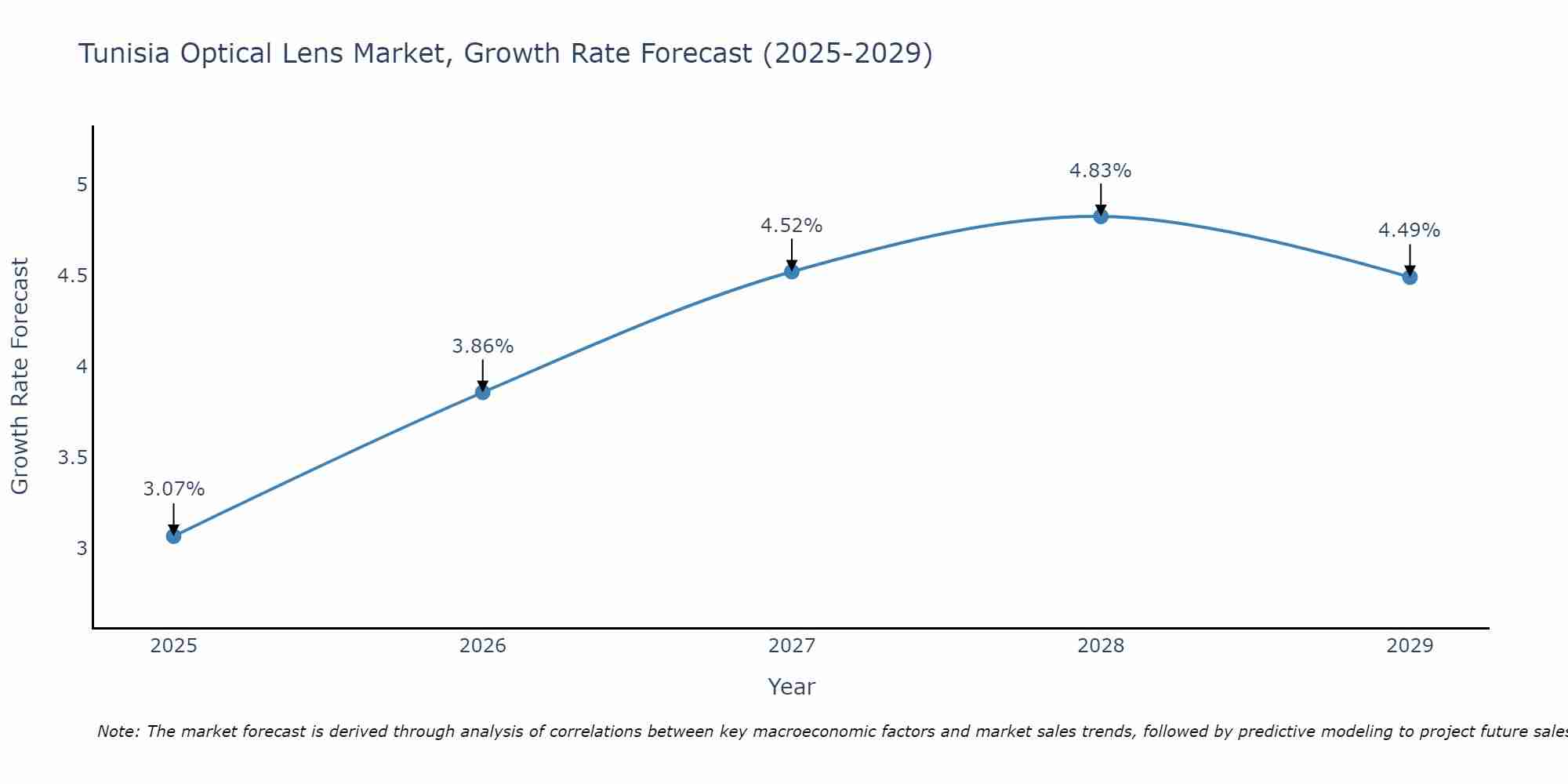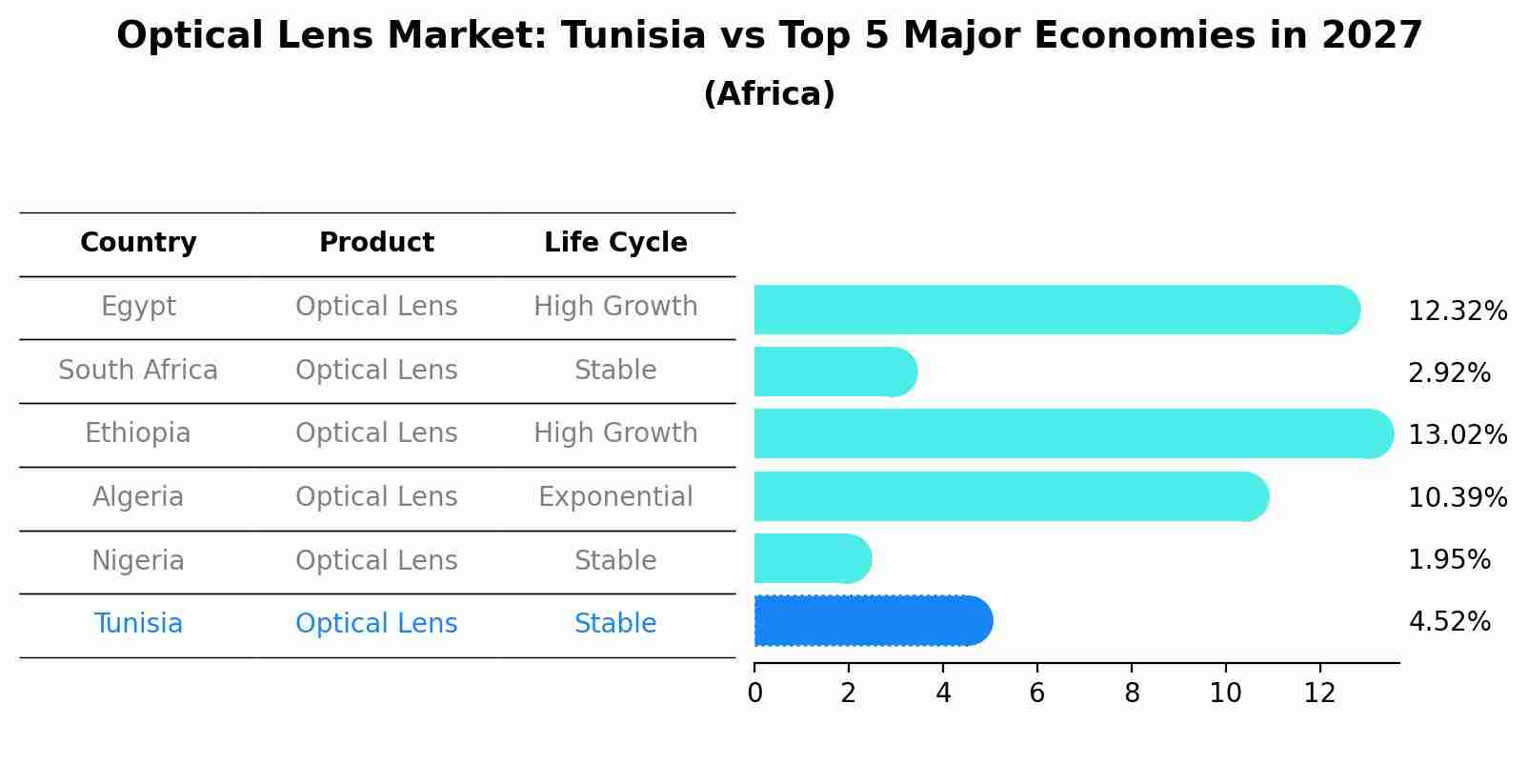Tunisia Optical Lens Market Outlook | Share, Revenue, Analysis, Size, Growth, Industry, Forecast, Value, Companies, COVID-19 IMPACT & Trends
| Product Code: ETC367974 | Publication Date: Aug 2022 | Updated Date: Jul 2025 | Product Type: Market Research Report | |
| Publisher: 6Wresearch | Author: Shubham Padhi | No. of Pages: 75 | No. of Figures: 35 | No. of Tables: 20 |
Tunisia Optical Lens Market Size Growth Rate
The Tunisia Optical Lens Market is projected to witness mixed growth rate patterns during 2025 to 2029. Growth accelerates to 4.83% in 2028, following an initial rate of 3.07%, before easing to 4.49% at the end of the period.

Optical Lens Market: Tunisia vs Top 5 Major Economies in 2027 (Africa)
Tunisia's Optical Lens market is anticipated to experience a stable growth rate of 4.52% by 2027, reflecting trends observed in the largest economy Egypt, followed by South Africa, Ethiopia, Algeria and Nigeria.

Tunisia Optical Lens Market Synopsis
The Tunisia optical lens market is experiencing steady growth driven by factors such as increasing awareness about eye health, rising prevalence of vision-related disorders, and technological advancements in lens materials. The demand for optical lenses is also boosted by the growing aging population and the increasing adoption of corrective eyewear among younger demographics. The market is characterized by the presence of both domestic and international players offering a wide range of products, including prescription lenses, contact lenses, and specialty lenses. Key trends in the market include the rising popularity of blue light blocking lenses and the increasing focus on eco-friendly and sustainable lens materials. Overall, the Tunisia optical lens market is poised for further expansion, supported by evolving consumer preferences and advancements in optical technology.
Tunisia Optical Lens Market Trends
The Tunisia Optical Lens Market is experiencing several key trends. One notable trend is the increasing adoption of advanced lens technologies such as blue light filtering lenses and photochromic lenses, driven by rising awareness of eye health and digital device usage. Another trend is the growing demand for customizable lenses to cater to individual preferences and specific visual needs. Additionally, there is a shift towards eco-friendly and sustainable lens materials in response to consumer preferences for environmentally conscious products. The market is also witnessing a rise in online sales of optical lenses, as e-commerce platforms gain popularity among consumers for their convenience and wide product selection. Overall, these trends indicate a shift towards more innovative, personalized, and sustainable offerings in the Tunisia Optical Lens Market.
Tunisia Optical Lens Market Challenges
In the Tunisia Optical Lens Market, some key challenges include fierce competition from both domestic and international players, resulting in pricing pressures and margin erosion. Additionally, the market is highly sensitive to economic fluctuations, which can impact consumer spending on discretionary items like eyewear. Limited awareness about the importance of regular eye check-ups and the benefits of using quality optical lenses also pose a challenge in driving demand. Furthermore, the presence of counterfeit products in the market contributes to consumer skepticism and hampers the growth of reputable optical lens brands. Addressing these challenges will require innovative marketing strategies, quality differentiation, and efforts to educate consumers about the value of investing in genuine, high-quality optical lenses.
Tunisia Optical Lens Market Investment Opportunities
The Tunisia Optical Lens Market presents several investment opportunities due to the increasing demand for eyewear products driven by factors such as the growing population, rising disposable income, and greater awareness of eye health. Investors can consider opportunities in manufacturing and distributing optical lenses, as well as in establishing retail outlets or online platforms for selling eyewear products. Additionally, there is potential for investment in technological advancements in lens manufacturing processes to improve product quality and cater to evolving consumer preferences. Collaborating with optometrists and eye care professionals to provide specialized lens solutions could also be a lucrative investment avenue. Overall, the Tunisia Optical Lens Market offers a promising landscape for investors looking to capitalize on the growing demand for eyewear products in the region.
Jordan Agar Market Government Policies
In Tunisia, the optical lens market is regulated and overseen by the Ministry of Health, which sets standards for the manufacturing and distribution of optical lenses to ensure quality and safety for consumers. The government has implemented policies that require all optical products, including lenses, to meet specific specifications and undergo rigorous testing before being approved for sale in the market. Additionally, there are regulations in place that govern the licensing and registration of optical shops and practitioners to maintain professional standards and protect consumers from substandard products and services. These policies aim to promote a competitive and transparent market while safeguarding the health and well-being of the Tunisian population in need of optical products and services.
Tunisia Optical Lens Market Future Outlook
The Tunisia Optical Lens Market is expected to show steady growth in the coming years, driven by factors such as increasing awareness about eye health, rising disposable income, and a growing elderly population. The market is likely to benefit from technological advancements in lens manufacturing and design, leading to the introduction of innovative products that cater to the specific needs of consumers. Additionally, the rising prevalence of vision-related disorders and an increasing focus on aesthetics and fashion trends are anticipated to boost the demand for optical lenses in Tunisia. However, the market may face challenges such as intense competition among key players and potential pricing pressures. Overall, the future outlook for the Tunisia Optical Lens Market appears positive, with opportunities for growth and expansion in the forecast period.
Key Highlights of the Report:
- Tunisia Optical Lens Market Outlook
- Market Size of Tunisia Optical Lens Market, 2021
- Forecast of Tunisia Optical Lens Market, 2031
- Historical Data and Forecast of Tunisia Optical Lens Revenues & Volume for the Period 2018 - 2031
- Tunisia Optical Lens Market Trend Evolution
- Tunisia Optical Lens Market Drivers and Challenges
- Tunisia Optical Lens Price Trends
- Tunisia Optical Lens Porter's Five Forces
- Tunisia Optical Lens Industry Life Cycle
- Historical Data and Forecast of Tunisia Optical Lens Market Revenues & Volume By Type for the Period 2018 - 2031
- Historical Data and Forecast of Tunisia Optical Lens Market Revenues & Volume By Converging Lenses for the Period 2018 - 2031
- Historical Data and Forecast of Tunisia Optical Lens Market Revenues & Volume By Diverging Lenses for the Period 2018 - 2031
- Historical Data and Forecast of Tunisia Optical Lens Market Revenues & Volume By Application for the Period 2018 - 2031
- Historical Data and Forecast of Tunisia Optical Lens Market Revenues & Volume By Ophthalmic for the Period 2018 - 2031
- Historical Data and Forecast of Tunisia Optical Lens Market Revenues & Volume By Microscopy for the Period 2018 - 2031
- Historical Data and Forecast of Tunisia Optical Lens Market Revenues & Volume By Laser Processing for the Period 2018 - 2031
- Historical Data and Forecast of Tunisia Optical Lens Market Revenues & Volume By Imaging for the Period 2018 - 2031
- Historical Data and Forecast of Tunisia Optical Lens Market Revenues & Volume By End-User for the Period 2018 - 2031
- Historical Data and Forecast of Tunisia Optical Lens Market Revenues & Volume By Consumer Electronics for the Period 2018 - 2031
- Historical Data and Forecast of Tunisia Optical Lens Market Revenues & Volume By Defense for the Period 2018 - 2031
- Historical Data and Forecast of Tunisia Optical Lens Market Revenues & Volume By Healthcare for the Period 2018 - 2031
- Historical Data and Forecast of Tunisia Optical Lens Market Revenues & Volume By Life Sciences for the Period 2018 - 2031
- Historical Data and Forecast of Tunisia Optical Lens Market Revenues & Volume By Others for the Period 2018 - 2031
- Tunisia Optical Lens Import Export Trade Statistics
- Market Opportunity Assessment By Type
- Market Opportunity Assessment By Application
- Market Opportunity Assessment By End-User
- Tunisia Optical Lens Top Companies Market Share
- Tunisia Optical Lens Competitive Benchmarking By Technical and Operational Parameters
- Tunisia Optical Lens Company Profiles
- Tunisia Optical Lens Key Strategic Recommendations
Frequently Asked Questions About the Market Study (FAQs):
- Single User License$ 1,995
- Department License$ 2,400
- Site License$ 3,120
- Global License$ 3,795
Search
Related Reports
- Portugal Electronic Document Management Market (2025-2031) | Strategy, Consumer Insights, Analysis, Investment Trends, Opportunities, Growth, Size, Share, Industry, Revenue, Segments, Value, Segmentation, Supply, Forecast, Restraints, Outlook, Competition, Drivers, Trends, Demand, Pricing Analysis, Competitive, Strategic Insights, Companies, Challenges
- France Electronic Document Management Market (2025-2031) | Strategy, Consumer Insights, Analysis, Investment Trends, Opportunities, Growth, Size, Share, Industry, Revenue, Segments, Value, Segmentation, Supply, Forecast, Restraints, Outlook, Competition, Drivers, Trends, Demand, Pricing Analysis, Competitive, Strategic Insights, Companies, Challenges
- Portugal Occupational Health & Safety Services Market (2025-2031) | Strategy, Consumer Insights, Analysis, Investment Trends, Opportunities, Growth, Size, Share, Industry, Revenue, Segments, Value, Segmentation, Supply, Forecast, Restraints, Outlook, Competition, Drivers, Trends, Demand, Pricing Analysis, Competitive, Strategic Insights, Companies, Challenges
- Netherlands Occupational Health and Safety Services Market (2025-2031) | Strategy, Consumer Insights, Analysis, Investment Trends, Opportunities, Growth, Size, Share, Industry, Revenue, Segments, Value, Segmentation, Supply, Forecast, Restraints, Outlook, Competition, Drivers, Trends, Demand, Pricing Analysis, Competitive, Strategic Insights, Companies, Challenges
- Belgium and Luxembourg Facility Management Market (2025-2031) | Strategy, Consumer Insights, Analysis, Investment Trends, Opportunities, Growth, Size, Share, Industry, Revenue, Segments, Value, Segmentation, Supply, Forecast, Restraints, Outlook, Competition, Drivers, Trends, Demand, Pricing Analysis, Competitive, Strategic Insights, Companies, Challenges
- Russia Women Intimate Apparel Market (2025-2031) | Strategy, Consumer Insights, Analysis, Investment Trends, Opportunities, Growth, Size, Share, Industry, Revenue, Segments, Value, Segmentation, Supply, Forecast, Restraints, Outlook, Competition, Drivers, Trends, Demand, Pricing Analysis, Competitive, Strategic Insights, Companies, Challenges
- Africa Chocolate Market (2025-2031) | Size, Share, Trends, Growth, Revenue, Analysis, Forecast, industry & Outlook
- Global Hydroxychloroquine And Chloroquine Market (2025-2031) | Industry, Trends, Size, Outlook, Growth, Value, Companies, Revenue, Analysis, Share, Forecast
- Saudi Arabia Plant Maintenance Market (2025-2031) | Industry, Size, Growth, Revenue, Value, Companies, Forecast, Analysis, Share & Trends
- Taiwan Electric Truck Market (2025-2031) | Outlook, Industry, Revenue, Size, Forecast, Growth, Analysis, Share, Companies, Value & Trends
Industry Events and Analyst Meet
Our Clients
Whitepaper
- Middle East & Africa Commercial Security Market Click here to view more.
- Middle East & Africa Fire Safety Systems & Equipment Market Click here to view more.
- GCC Drone Market Click here to view more.
- Middle East Lighting Fixture Market Click here to view more.
- GCC Physical & Perimeter Security Market Click here to view more.
6WResearch In News
- Doha a strategic location for EV manufacturing hub: IPA Qatar
- Demand for luxury TVs surging in the GCC, says Samsung
- Empowering Growth: The Thriving Journey of Bangladesh’s Cable Industry
- Demand for luxury TVs surging in the GCC, says Samsung
- Video call with a traditional healer? Once unthinkable, it’s now common in South Africa
- Intelligent Buildings To Smooth GCC’s Path To Net Zero













